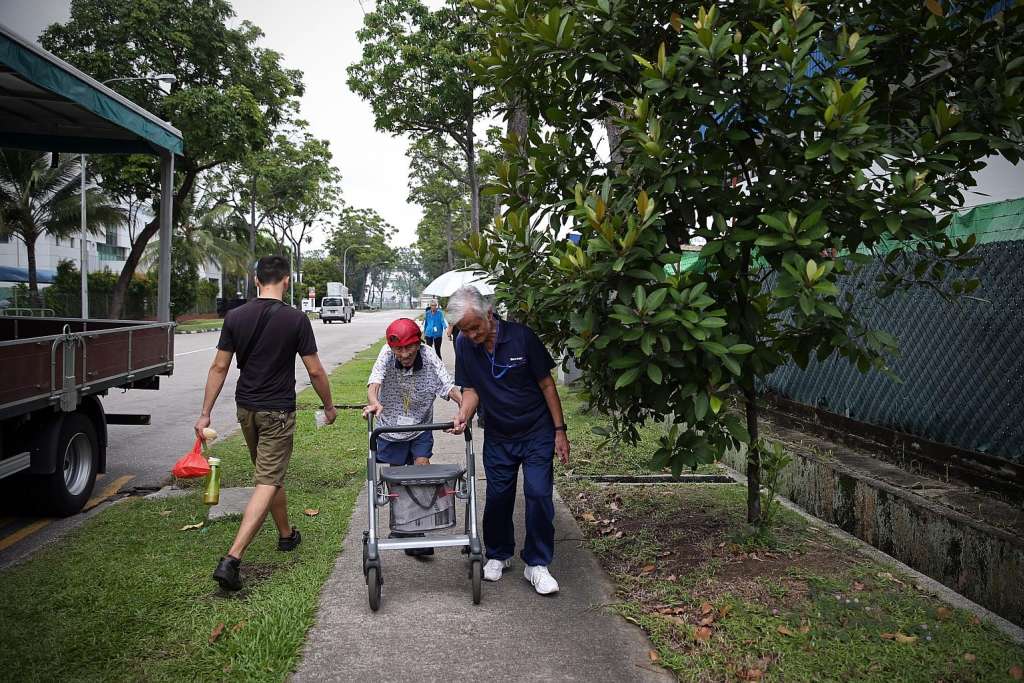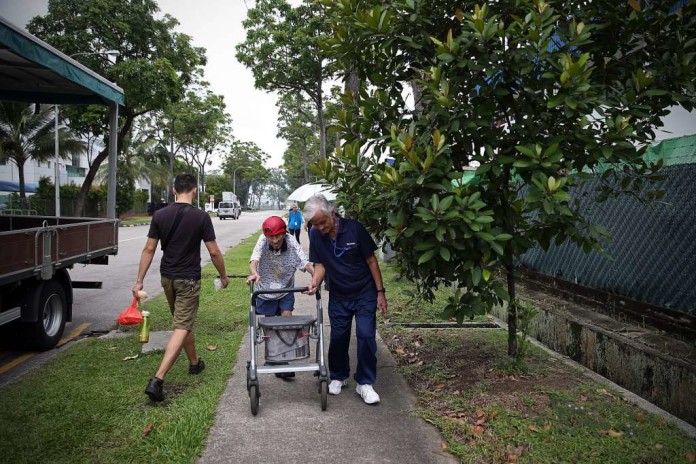It is lunchtime. Mr Mustafa Md Yunus stops work and waits for his kawan (“friend” in Malay), Mr Lim Jin Huat, to put on his favourite red cap. He is 81 and his friend is 75.
Holding on to Mr Lim’s rolling walker with one hand, Mr Mustafa guides him as they make their way slowly to a nearby food centre.
Mr Mustafa has Alzheimer’s disease and Mr Lim has dementia. Both live with assistance at Apex Harmony Lodge, Singapore’s first home for people with dementia, in Pasir Ris.
Every Tuesday and Thursday, a chartered minibus takes a small group of residents, accompanied by staff caregivers, to Orchid Laundry in Tuas, an hour away.
There, they spend the morning folding a variety of clean towels and mats as part of the lodge’s Therapy Through Work programme.
Started in December 2013, the programme provides the therapeutic effect of “work” for residents who are still able to find such activity meaningful.
This helps maintain life as it used to be, pre-dementia, as much as possible.
Apex Harmony Lodge engages about 50 residents who are diagnosed with mild to moderate dementia in work-related activities offered by business partners.
Aside from gaining a sense of purpose and thus self-worth, residents learn to handle tasks themselves and get to exercise cognitive abilities such as attention and recall.
“Whenever Mr Lim sees the facilitators, he asks about work. It helps them keep track of the days because if there is nothing to do, there is no reason to know what day it is,” said therapeutic programme executive Petrina Goh, 25.
“You can really see their work ethic. Mr Lim prides himself on the speed at which he works and he will chide the staff if he sees them not working.
Mr Mustafa prides himself on quality as he really makes sure the towels are folded properly, neatly and that the numbers are right,” she added.
Other work-related activities offered by the lodge include cutlery packing and gardening.
Set up in 1999, the lodge, which currently looks after 200 residents, has a team of 85 nursing staff, 20 psychosocial staff – including art and music therapists and activities coordinators – and 10 who provide support functions.
The voluntary welfare organisation adopts an integrated and person-centred care model for people with dementia that cares for them holistically, taking into account their social, emotional, physical and cognitive needs.
Under staff supervision, residents have the choice to go for walks and exercise at Changi Beach Park, have breakfast while reading the papers at White Sands shopping centre, take part in creative therapy and go for high tea.
A recent report commissioned by local philanthropic houses Lien Foundation and Khoo Chwee Neo Foundation underscored the need for nursing homes to go beyond just clinical care.
Lien Foundation has committed some $2.6 million to Apex until 2018, so it can recruit more staff providing psychosocial care and build capabilities.
One in 10 people aged 60 and above in Singapore has dementia, and the condition strikes half of those aged 85 and beyond, according to findings from a large-scale study released by the Institute of Mental Health last year.
Both Mr Mustafa and Mr Lim take part in at least four activities together and have developed a unique friendship.
“Sometimes we underestimate people with dementia. We think they have lost their capability to make social connections, but they have not.
There is a lot unspoken. Mustafa and Jin Huat do not just look out for each other during work, but also day to day as well,” said Ms Soh Mee Choo, 56, Apex Harmony Lodge’s chief executive.
She cited an example in which the usually mild-mannered Mr Mustafa became angry with another resident for being rude to Mr Lim, who has a slight hearing impairment, as well as communication problems.
“I had never seen Mustafa in such a furious mood. He stood up and wanted to defend (Mr Lim).”
Ms Soh, who spent almost 10 years in special education, said that while the needs of a person with dementia are different, his strengths are also different.
“Instead of focusing on what they can’t do, do we have the eyes to see the beauty, strengths and good in them?”
Moving forward, she recognises that one of the challenges in caring for people with dementia is their evolving needs.
“The current work-related activities may not excite the next generation of residents, so we need to be visionary, to be thinking ahead to ask ourselves: Whatever we do today, will it still be applicable and relevant three years down the road?”
Other challenges include finding relevant business partners with the same beliefs, grooming people for the future, raising funds and keeping programmes sustainable.
“Now that I’m in the sector, I know how tough it is,” said Ms Soh. “Day-to-day operations are already a lot to handle, but on top of that, you need people to think beyond the present and conceptualise the future.
“I’m hoping that with the kind of effort, with the kind of outcomes we have, that there will be different quality assurance systems as well as policies to meet the needs of people with dementia so they can continue to live well.”

This article was first published on December 08, 2016.
Get a copy of The Straits Times or go to straitstimes.com for more stories.







